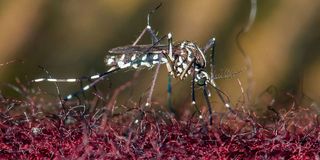Why Mombasa is prone to Chikungunya, Dengue fever

Chikungunya, a mosquito-borne disease, has no specific treatment and can be debilitating and even deadly for newborns. Photo| Shutterstock
Poor drainage, stagnant water, uncontrolled waste disposal and tropical humidity are among the leading causes of vector-borne diseases in Mombasa County, amidst a fresh outbreak of Chikungunya.
The viral disease, transmitted by the Aedes aegypti mosquito, has put health officials on high alert after the county recorded 25 confirmed cases of the disease last week.
The Mombasa County government has since launched an aggressive indoor and outdoor fumigation campaign targeting densely populated neighbourhoods, schools, hospitals and other public institutions to contain the outbreak.
According to the World Health Organisation (WHO), Chikungunya is a viral disease characterised by an abrupt onset of fever frequently accompanied by joint pain. Other common signs and symptoms include muscle pain, headache, nausea, fatigue, and rash.
The disease shares clinical signs with dengue and Zika, and can be misdiagnosed in areas where these diseases are common. While Chikungunya is rarely fatal, the joint pain can be debilitating and may persist for weeks, months, or even years in some cases.
“In the wake of widespread cases of Chikungunya, we have launched an intensified vector control campaign focused on disrupting the mosquito life cycle,” the County Department of Health Services said in a statement released on Sunday.
The 25 cases of Chikungunya were confirmed in different parts of the county, with Mvita, Nyali, Likoni and Kisauni Sub-Counties singled out as the most affected areas. However, the number of those infected could be higher since most go unreported.
Acting Director of Public Health and Disease Prevention Dr Saumu Wayuwa urged residents to maintain high standards of hygiene, including timely disposal of rubbish, ensuring garbage is placed in designated areas, unclogging drainage systems and covering water containers tightly to prevent mosquito breeding.
She warned that unless urgent action is taken, the disease could spread rapidly across the city, especially during the current rainy season.
Environment factor
“This is a preventable disease, but the environment we are living in is enabling its spread. We are urging residents to cooperate with our health teams during this fumigation exercise, which is targeting indoor-breeding mosquitoes,” said Dr Wayuwa.
She added that they have initiated targeted fumigation and will follow it up with fogging to prevent secondary outbreaks of dengue and malaria. Dr Wayuwa also noted that the county’s emergency centre is actively collecting and following up on all reported cases.
Her sentiments were echoed by Dr Hussein Bilal, a public health officer, who called on residents to be vigilant in waste management.
“We encourage the public to do proper garbage disposal to avoid garbage mounting in our surroundings, unclog drainage systems and remove stagnant water,” said Dr Bilal.
According to the WHO, Chikungunya outbreaks frequently occur in parts of Africa, Asia, Europe, and the Americas.
The disease often arises in cyclical outbreaks, particularly in areas where vector control is inadequate and public awareness is low. Climate factors such as rainfall, temperature, and humidity greatly influence mosquito breeding and disease transmission patterns.
While many patients recover within a few days, the symptoms of Chikungunya can be severe and weakening, especially for older adults and those with underlying medical conditions.
“There is no vaccine or specific treatment for Chikungunya. Patients are advised to rest, drink plenty of fluids and use pain relievers to manage pain and fever. Aspirin and anti-inflammatory drugs should be avoided because of the risk of internal bleeding,” said Dr Wayuwa.
As part of the county's broader prevention campaign, residents have been urged to adopt personal protection measures including the use of mosquito repellents, sleeping under insecticide-treated nets, wearing long-sleeved clothing and ensuring their surroundings are free from stagnant water.
Health officials say the fumigation drive will continue over the coming weeks with a focus on neighbourhoods that have recorded the highest number of cases.
The manager of the emergency unit, Ms Fatuma Ali, has called on residents to clear bushes and unclog drainage around their residential areas. The county government has appealed to residents to report any new or suspected cases to the nearest health centre.


